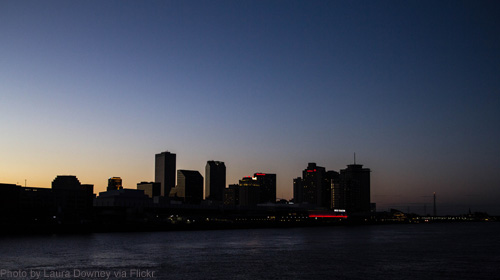Louisiana Blocks Ebola Scientists From Meeting in New Orleans in Latest Counterproductive Over-Reaction


The state of Louisiana the organizers of a scientific conference that Ebola researchers who have recently returned from West Africa would not be permitted to travel to New Orleans for the conference—and would be quarantined if they showed up (official letter ). The group, the American Society of Tropical Medicine and Hygiene, has the state’s action.
Could it become any more obvious that over-reaction to Ebola is undercutting actual efforts to stop the spread of the disease?
Face-to-face meetings of experts are a crucial part of any profession. They are where insights are shared, research is exchanged, and relationships are formed. As a group of scientific organizations in a letter to government officials several years ago,
Participation in scientific conferences is a critical opportunity for scientists and engineers to keep current in rapidly changing fields of science and technology. These conferences facilitate communication among scientists, engineers, practitioners and students. They provide an important venue for presenting cutting-edge research.
Indeed, anthropologists studying the subject that face-to-face communications "are crucial for sustaining the social relationships that make distributed work possible."
Here we have a group of scientists who are professionally dedicated to learning more about Ebola, which must surely be a critical part of actually fighting the disease—and yet Louisiana is interfering with this vital scientific function. The state Department of Health and Hospitals statement actually concedes that “from a medical perspective, asymptomatic individuals are not at risk of exposing others.” Exactly. That should be the end of it. As the New England Journal of Medicine has , with Ebola “we now know that fever precedes the contagious stage.” Let’s all repeat that together: Fever Precedes Contagiousness.
We know this, NEJM points out, not only from clinical observation in Africa but also from the extremely sensitive that can detect even minute quantities of the virus in the blood stream of infected individuals. That test is “often negative on the day when fever or other symptoms begin and only becomes reliably positive 2 to 3 days after symptom onset,” as the NEJM writes.
But that’s not the end of it, unfortunately. The Louisiana letter continues, “however, the State is committed to preventing any unnecessary exposure of Ebola to the general public,” and goes on to state that anyone who has visited West Africa would be asked to “remain in a self-quarantine for the 21 days following their relevant travel history.” This is for “the protection of Louisiana residents and other visitors.” Any researchers who do show up, the state warns, will be “confined to your room.”
If, “from a medical perspective,” there is no “risk of exposing others,” as the state concedes, then why does it claim it’s for the protection of others?
The answer, obviously, is politics. In New Jersey, Maine, and elsewhere we have seen how politically driven over-reaction to Ebola has threatened to undercut the very battle against the disease, for example by stigmatizing and deterring health care workers from volunteering in the battle. But this latest move in Louisiana is an even clearer example of the problem.
From a local standpoint, as my colleagues at the ACLU of Louisiana point out to me, this step is particularly ironic because the oldest school of tropical medicine in the United States is in New Orleans, the School of Public Health and Tropical Medicine at (which the policy). To keep researchers on the tropical medical issue of our time away from the city with the only school devoted entirely to their study is especially sad.


